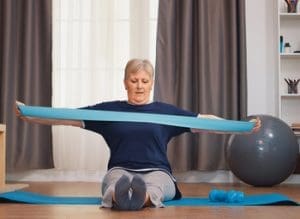
Resistance training for depression and anxiety: It works
Details matter. Your therapist can recommend a radical change to your diet. But if specifics are left out, your depression and anxiety will be left in. The same applies to exercise, so let’s talk about resistance training…
You can use your body weight to do pushups, squats, and more. And if you’re working out at home you can use things like gallon jugs of water…
If you’ve been hanging around the mood and anxiety neck of the woods for any length of time, you know that exercise is good for what ails us.
It’s been part of my “all hands on deck” relief regimen for decades.
Background
During a recent online research journey, this article title grabbed my attention: “UL research confirms benefits of resistance exercise training in treatment of anxiety and depression.” Bam!
It was a news release announcing the results of a new study, published in the journal Trends in Molecular Medicine, conducted by Professor Matthew P. Herring of the University of Limerick and Professor Jacob D. Meyer of Iowa State University.
The study provides evidence to support the benefits of resistance exercise training on anxiety and depression. It also offers an examination of possible underlying mechanisms.
Let’s do it…
Resistance training for depression and anxiety
Drs. Herring and Meyer declared there was “exciting evidence” that resistance exercise training (we’ll call it resistance training: RT) may be an accessible alternative therapy to improve anxiety and depression – like more established therapies – while also improving other important aspects of health.
According to Dr. Herring…
Anxiety and depressive symptoms and disorders are prevalent and debilitating public health burdens for which successful treatment is limited.
The healthful benefits of resistance exercise training, or muscle-strengthening exercise involving exerting force against a load repeatedly for the purpose of generating a training response, are well-established.
Frustratingly, the good and promising news continues to be understudied, especially when it comes to the how’s and why’s.
Before moving on with the research, let’s learn a little bit about RT…
What is resistance training?

Resistance training: gym not required
RT (aka strength or weight training) is a form of exercise intended to increase muscular strength and endurance using, uh, resistance. And that resistance can be supplied by weights, bands, even our own body weight working against gravity.
RT is typically used to facilitate joint stability, weight management, increased muscle size, muscular endurance, strength, and power. And now we can add depression and anxiety relief to the list.
Best part is, you can do RT at the gym or right at home.
Equipment
Knock yourself out investing in barbells, dumbbells, resistance bands, etc. But you know what? You can use your body weight to do pushups, squats, and more.
And if you’re working out at home you can use things like gallon jugs of water, soup cans in a canvas bag, or a backpack with an unopened bag of flour. Get creative, have fun.
Before getting started, be sure to research workout details so you can find the best fit. And, yes, check in with your doc.
Study details and outcomes
As they get started, Drs. Herring and Meyer acknowledge that available studies focus upon relatively small sample sizes.
However, they emphasize that previous and ongoing work at their universities provide sufficient evidence to suggest that RT improves anxiety and depressive symptoms and disorders (though disorders are rarely studied).
Herring sweetens the pot by stating RTs soothing impact on depression and anxiety can be parrtially attributed to its influence on insulin-like growth factor, cerebrovascular adaptations, and potential neural adaptations generated by the controlled breathing inherent to RT.
Dr. Herring…
A more exciting aspect is that there is substantial promise in investigating the unknown mechanisms that may underlie these benefits to move us closer to maximizing benefits and to optimizing the prescription of resistance exercise via precision medicine approaches.
Be sure to hit the precision medicine link – interesting stuff.
Finally, taking into account aerobic exercise, Herring and Meyer point out that RT likely achieves its positive depression and anxiety effects through shared and distinct mechanisms.
That means RT has the potential to be used in conjunction with aerobic exercise or as a standalone therapy.
Much more to come from Drs. Herring and Meyer, I’m sure.
All hands on deck
I adopted my “all hands on deck” depression and anxiety relief regimen years ago. Hey, it’s legal, causes no harm, and can help – I’m in.
If we’re on the same page and you can physically tolerate exercise, why not consider resistance training? It works.
Be sure to check out the UL news release, which includes a link to the study: “UL research confirms benefits of resistance exercise tracing in treatment of anxiety and depression.”
Thank you to Verywell Fit and author Nicole M. LaMarco for “What Is Resistance Training and Why Is It Important?” Lots of great info if you’re serious about learning.
And, of course, those Chipur emotional and mental health info and inspiration articles.
Bill White is not a physician and provides this information for educational purposes only. Always contact your physician with questions and for advice and recommendations.






